It’s easy to make mistakes as a beginner freelance writer. In fact, it’s pretty much necessary! We all make them, but it’s useful to be aware of some of the most common ones when you’re first starting out.
Below, I’ll go into detail about the most common mistakes (many of which I’ve made myself). I’ll talk about why they’re important to avoid, and give you some tips to ensure you don’t make them when first starting out as a freelance writer.
1. Undercharging Or Overcharging Clients
Undercharging or overcharging clients is an easy mistake for beginner freelance writers to make. When you’re starting out, you may undervalue your skills and charge lower rates than you deserve. Either out of fear of losing potential clients or due to a lack of confidence in your abilities.
On the other hand, some writers may overestimate their worth and set prices that are much higher than what potential clients are willing to pay. Both of these scenarios can have significant consequences on your freelance writing career.
Undercharging
Undercharging clients can lead to a cycle of low-paying gigs that undervalue your skills and time. Clients may come to expect lower rates from you, making it difficult to raise your prices in the future.
Undercharging can also lead to financial strain, as you may struggle to make a sustainable income. It can also affect your motivation and self-esteem, as you may feel undervalued and under appreciated for your work.
Personal note: I took the idea of undercharging to the extreme when I first started freelancing. I completed a job on Fiverr that netted me the equivalent of a whopping $2 per hour. I don’t recommend you do the same!
Overcharging
Overcharging clients, on the other hand, can result in the loss of potential business or limited job opportunities. If your rates are significantly higher than what other freelance writers in your niche are charging, clients may opt for more affordable options without even considering your services.
Overcharging can also damage your reputation, as clients may perceive you as greedy or unrealistic in your pricing. Especially if they also know you’re just starting out (likely through a lack of testimonials in the beginning).
How To Avoid This Mistake
To avoid the mistake of undercharging or overcharging your freelance writing clients, it’s important to research industry standards and understand the value of your services. Take into account factors like:
- Your level of expertise
- The complexity of the project
- The time required
- The effort required
Conduct market research to see what other freelance writers are charging in your niche. By setting reasonable rates that align with your skills and the market demand, you can attract clients who are willing to pay fair prices.
While you can look at salary websites for recent numbers, they’re often from small sample sizes. And they quickly go out of date.
So I recommend asking around in your network. Or in communities like the freelance writing subreddit.
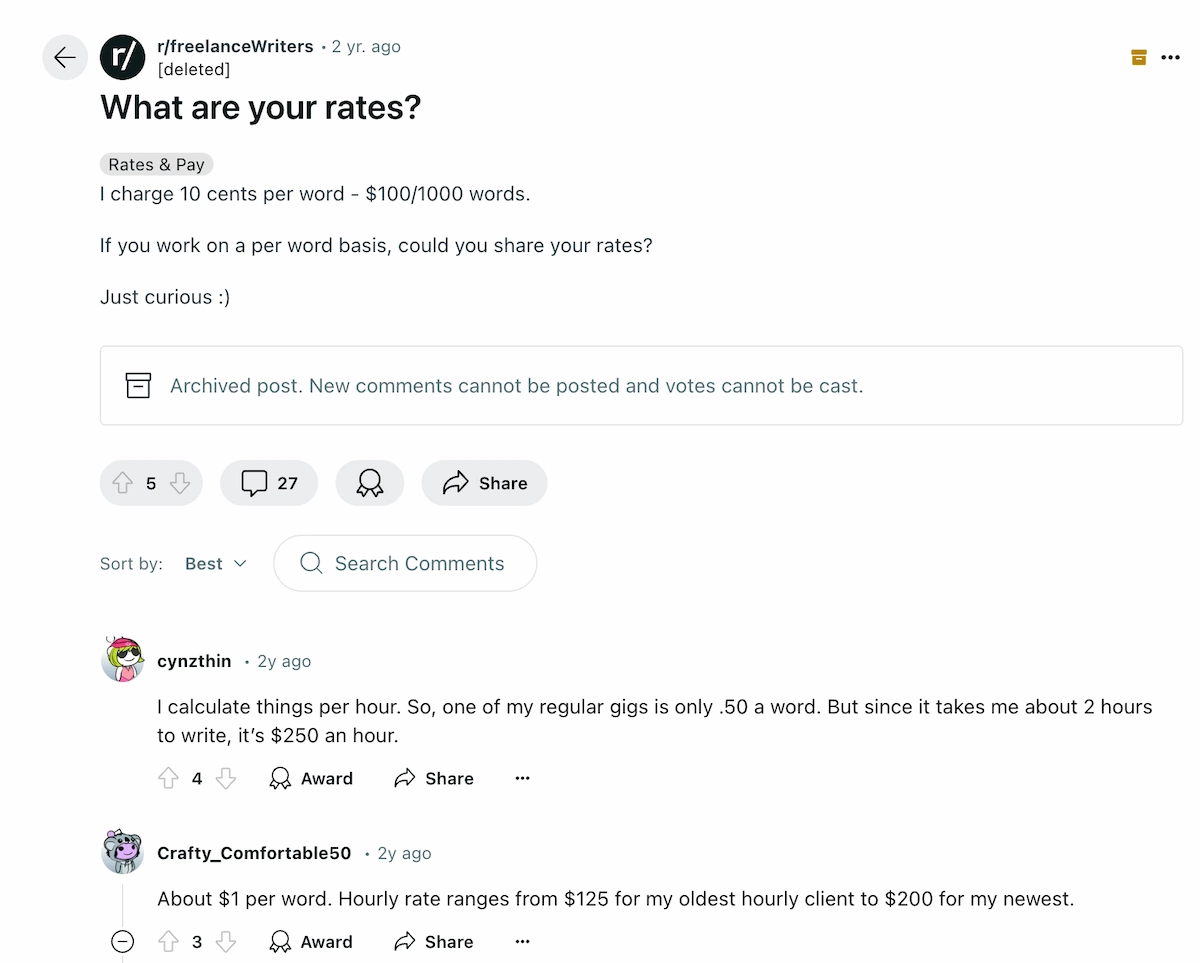
Another helpful tip is to clearly communicate your rates to potential clients from the beginning. Include your pricing structure on your website (more on that later) or in your initial communications, so there are no surprises later on. Be confident in your abilities and the value you bring to the table, but also be open to negotiation if necessary.
Building a solid portfolio and gathering testimonials from satisfied clients can also strengthen your case for fair pricing. Finding the right balance between charging too little and charging too much is essential for establishing a successful freelance writing career. But a lot of it will just come from experience.
2. Failing To Define Your Niche
Many beginner freelance writers often feel the need to cast a wide net and accept any writing assignment that comes their way. I did that, and while it helped me get 100+ five-star reviews on Fiverr:
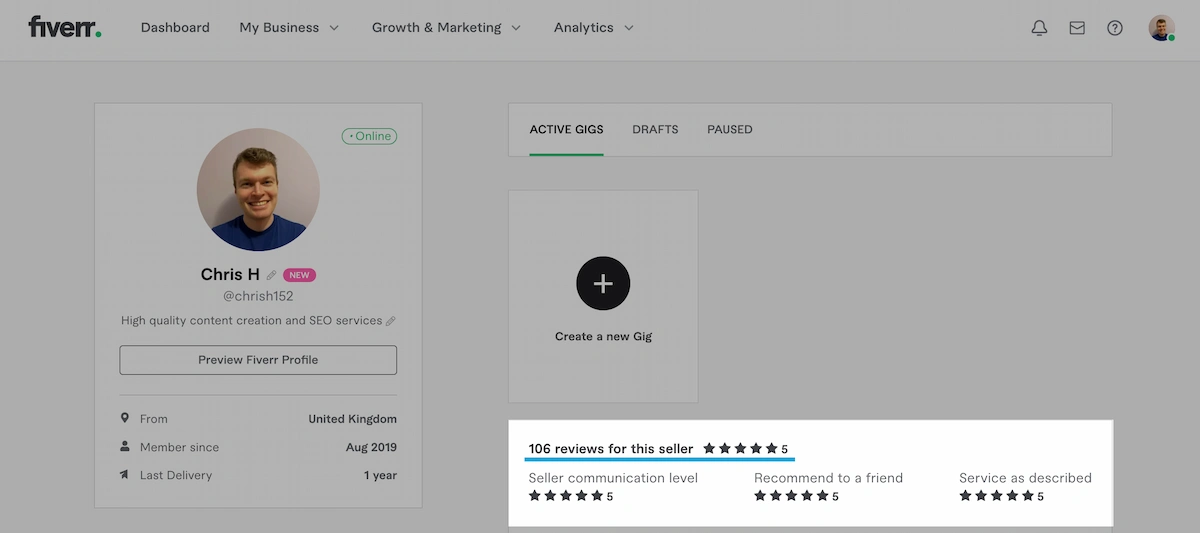
It didn’t earn me nearly as much money as when I started narrowing down the niches I wrote for.
By not defining a specific niche, you run the risk of diluting your expertise and becoming a jack-of-all-trades but a master of none.
It then becomes difficult to establish a strong professional identity and stand out in a crowded marketplace. Clients and potential employers often prefer to work with writers who specialize in a particular area or industry rather than a generalist. As they bring a deeper understanding and knowledge to the table.
Without a defined niche, you may struggle to attract high-quality clients or secure high-paying assignments.
Lack Of Focus
Not having a niche can also lead to a lack of focus and direction in your writing career. It becomes challenging to develop a targeted marketing strategy or build a portfolio that showcases your specialized expertise. This can result in wasted time and effort, as you may find yourself taking on projects that don’t align with your long-term goals or interests.
To avoid this mistake and find your niche, assess your strengths, passions, and areas of expertise. Consider the types of writing you enjoy and excel at, as well as any specific industries or subjects you have knowledge in.
As with the price-related mistake I discussed above, you should conduct market research to identify which niches have a demand for writing services and present potential growth opportunities. Check out job boards like ProBlogger to get an idea of what’s in demand.
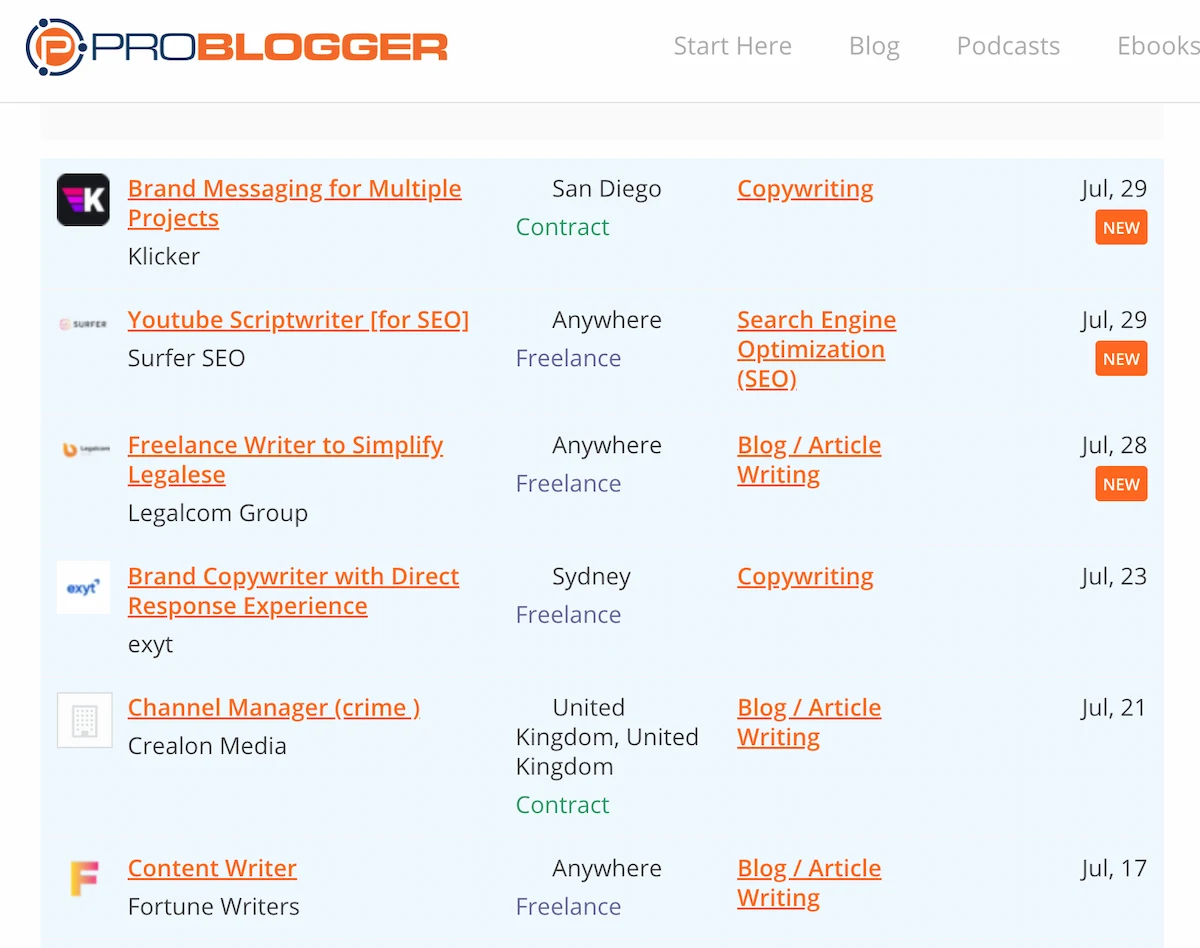
Once you identify your niche, focus on building your expertise and credibility in that area. Invest time in researching and staying up to date on industry trends, attending relevant conferences or webinars, and connecting with professionals in the space.
While it may feel counterintuitive to narrow your focus initially, defining a niche can actually lead to more opportunities and higher-quality clients in the long run. By positioning yourself as an expert in a specific field, you increase your chances of being sought after by clients who value specialized knowledge and are willing to pay a premium for it.
3. Not Having A Professional Website Or Portfolio
Your potential clients often rely on websites and portfolios to assess your skills and professionalism before they consider hiring you. Not having a professional website or portfolio can therefore lead to missed opportunities and limited credibility.
Without a central hub to display your writing samples, testimonials, and information about your services, it becomes harder for clients to assess whether you’re the right person for the job.
Not having a professional website or portfolio can also make it difficult to establish a strong personal brand. A well-designed website allows you to present yourself as a professional and showcase your unique writing style, expertise, and personality.
Without this online presence, you may struggle to differentiate yourself from other freelance writers and may be seen as less serious or committed to your craft.
Plus, it can make it easier for potential clients to find you if they (inevitably) run a quick Google search. For example, I specialize in SEO. I offer SEO services through a separate website, but I also offer writing and editing services for that niche.
So when you search for “chris hanna seo” I come up top:
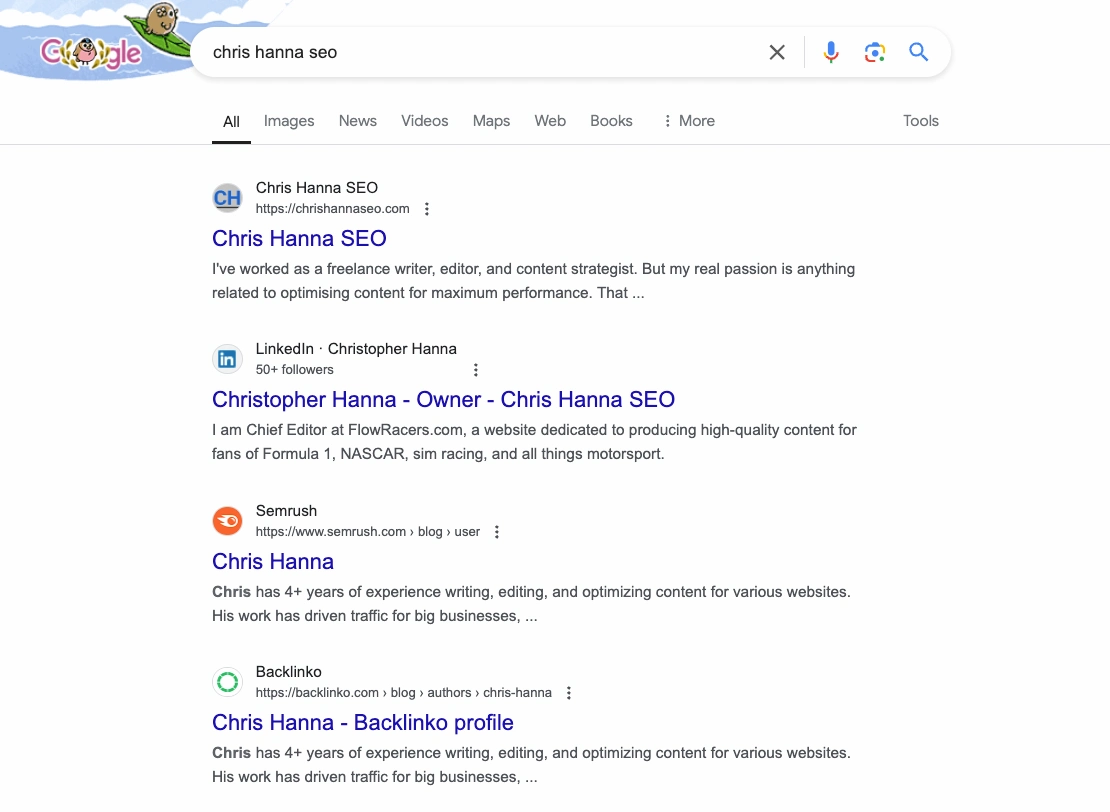
Largely thanks to having a personal website. But also because I have optimized my online presence elsewhere too.
How To Avoid This Mistake
Start by securing a domain name that aligns with your name or brand if you’re going the personal website route. Choose a clean and user-friendly website template that highlights your work and makes it easy for potential clients to navigate.
Create a portfolio section on your website where you can showcase your best writing samples. Include a diverse range of work that demonstrates your versatility and expertise in different topics or industries (ideally you’re niching down per the last mistake’s discussion!).
Here’s a simple example from Muriel Vega. Showcasing expertise in the technology and workspace niche in a clear way. With helpful links to each piece of content.

Regularly update your website with new content and testimonials from satisfied clients. Make sure that your contact information is easily accessible so that interested clients can reach out to you.
Alternatively, you could choose a portfolio maker. And there are many free ones out there. One example is Contently.

Remember, a professional website or portfolio serves as a powerful marketing tool that can help you attract clients, establish credibility, and stand out from the competition. Don’t sleep on the power of showing yourself off in a simple and effective way!
4. Not Marketing Or Promoting Yourself Enough
Many new freelance writers focus solely on their writing skills and assume that their work will speak for itself. However, without effective marketing and self-promotion, it becomes challenging to attract clients and establish a steady stream of work. Even with a solid portfolio. This mistake often stems from a fear of self-promotion or a lack of knowledge about marketing strategies.
The consequence is that it limits your visibility and makes it harder for potential clients to discover your services. Even if you are a talented writer, if you don’t actively market yourself, you may struggle to find consistent work.
Clients are unlikely to seek out your services if they don’t know you exist!
Developing A Marketing Strategy
It’s important to develop a comprehensive marketing strategy as early as you can. Start by identifying your target audience and understanding their needs and preferences. Research where your potential clients are present online and focus your marketing efforts on those channels. Whether it’s social media platforms, industry forums, or writing communities.
Create a strong online presence by regularly sharing valuable content, engaging with your audience, and showcasing your expertise. Leverage the power of social media platforms to build a following and establish yourself as an authority in your niche. Also consider guest posting on relevant blogs or websites as an additional way to expand your reach and gain exposure.
Don’t worry:
You don’t need to become an influencer. Or gather 10,000 followers. Or appear on the news as the next top writer in your niche.
You just need to put enough out there that it’s easy for potential clients to find you and assess whether you’re the writer they need.
Network, Network, Network
Networking is also crucial for effective self-promotion. You can attend industry events, join writing associations or groups, and connect with other writers to build new relationships with people in your space. Cultivate relationships with potential clients, fellow writers, and influencers who can help amplify your work and refer you to potential clients.
By actively promoting your services and establishing a strong online presence, you increase your chances of attracting clients, securing high-quality projects, and building a sustainable business.
Note: A lot of the networking aspect will happen naturally as you work with more and more clients. But it doesn’t hurt to actively seek out new relationships too.
5. Failing To Set Clear Boundaries
Not establishing clear boundaries can lead to a variety of negative consequences, including:
- Increased stress
- Compromised work-life balance
- Decreased job satisfaction
- A bad time overall
One reason it’s so easy to make this mistake as a beginner freelance writer is the fear of disappointing clients or losing potential projects. You’ll often feel pressured to be available and accommodating at all times. Leading to a blurred line between work and your personal life.
This can result in working long hours, accepting unrealistic deadlines, and sacrificing personal time. And your well-being.
The consequence of failing to set clear boundaries is burnout. Overworking and neglecting your personal needs can lead to physical and mental exhaustion, decreased productivity, and a decline in the quality of your work. Without proper boundaries, you can find yourself constantly stressed and overwhelmed. Which can ultimately affect your creativity and passion for writing.
Personal note: I’ve experienced burnout a few times and in various forms. It can be brutal, and it can make every aspect of the job more difficult. So it’s VITAL that you create boundaries early on.
Avoiding This Mistake
Establish your boundaries and communicate them effectively to clients at the start of the relationship. Start by clearly defining your working hours and availability. Let clients know when you’re available for communication and set realistic expectations for response times.
Also learn to say no when a project or request doesn’t align with your boundaries or capacity. It’s important to prioritize your well-being and avoid overcommitting yourself. Be assertive in negotiating deadlines and project scopes that are manageable and realistic.
Finally, create a schedule that includes dedicated time for work, rest, and personal activities. Stick to this schedule as much as possible, and resist the temptation to constantly be available for work!
Remember that setting boundaries isn’t just important for your own well-being. But also for maintaining a healthy and sustainable freelance career.
6. Ignoring Contracts Or Written Agreements
Beginner freelance writers may be eager to jump into projects and overlook the importance of formalizing agreements. You might assume that verbal agreements or informal discussions are sufficient. Leading to a lack of clarity and potential conflicts down the line.
The consequence of ignoring freelance contracts or written agreements include:
- An increased risk of disputes
- More misunderstandings
- Unpaid work
- Stress
Not having a contract or written agreement also leaves you vulnerable to exploitation or abuse by unscrupulous clients. In the absence of a formal agreement, clients may change project requirements, demand additional work without compensation, or fail to fulfill their payment obligations.
Without a legal document to reference, you might find it challenging to protect your rights and seek recourse in case of a dispute. (Although hopefully you’ll never have to do this.)
Always Have A Contract
This is why it is crucial for freelance writers to formalize all of their client relationships. Whenever you take on a new project, insist on having a written contract or agreement that clearly outlines the terms and conditions of the engagement.
Include essential details like:
- Project scope
- Key deliverables
- Project timelines
- Payment terms
- Termination clauses
Make sure both you and the client review and understand the contract before commencing work. If necessary, consult with a legal professional to ensure the contract covers all necessary aspects and provides adequate protection for your rights.
There are lots of tools out there to help you put together freelance contracts. My personal favorite is Bonsai:
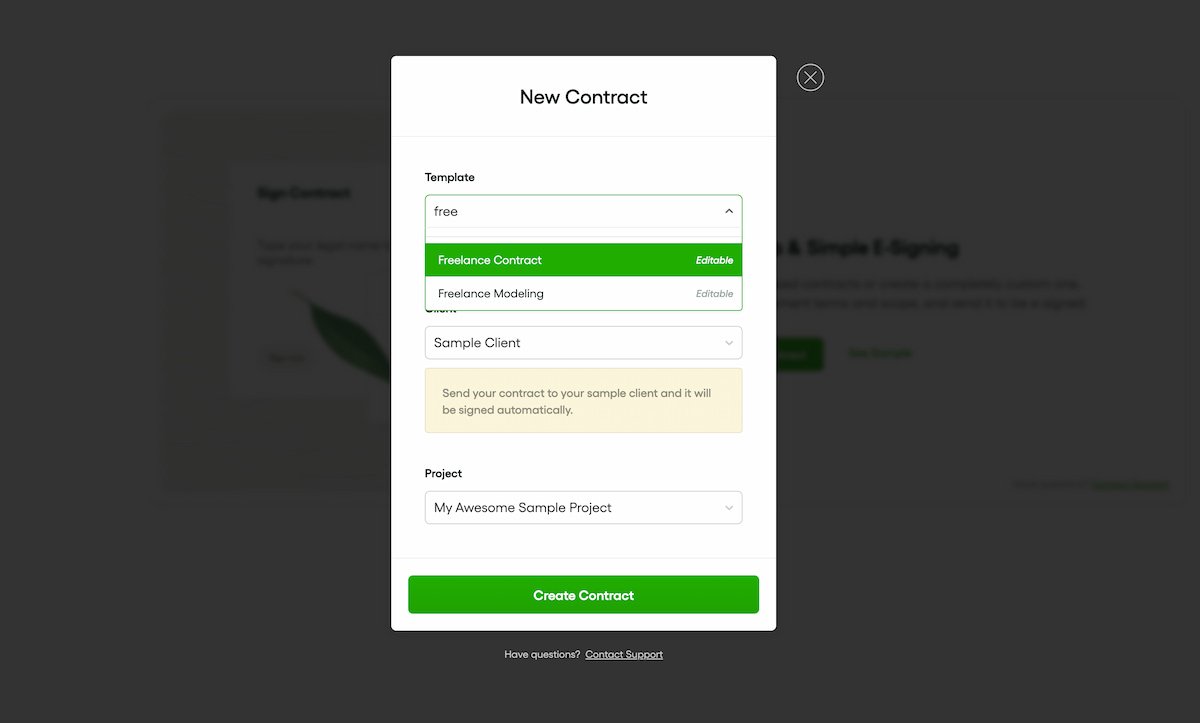
It’s super easy to use, and you can put contracts together in no time thanks to the large library of templates.
7. Not Managing Your Time Well
When working independently and without strict schedules, it’s easy to fall into the trap of poor time management. Procrastination, distractions, and a lack of structure can lead to missed deadlines, decreased productivity, and added stress.
One reason it’s so easy to make this mistake as a beginner is the freedom that comes with freelance writing. Without the traditional office environment and supervision, it can be tough to establish a disciplined routine.
Distractions like social media, household chores, or personal commitments can easily derail your focus and productivity. Honestly, this was probably one of the toughest parts of freelancing for me when I first started.
Not staying focused can quickly have a negative impact on work quality and client relationships. Missing deadlines or delivering subpar work due to poor time management can damage your professional reputation and lead to a loss of clients. It can also result in added stress as you rush to meet deadlines, sacrificing the time and attention needed to produce your best work.
How To Solve Your Time Management Crisis
To avoid this mistake, start by setting specific goals and deadlines for each project or assignment. Break larger tasks into smaller, more manageable chunks to avoid feeling overwhelmed. And create a daily or weekly to-do list to keep track of your priorities.
Identify and eliminate or minimize distractions during your dedicated work hours. Also set boundaries with friends and family and communicate your availability and need for uninterrupted focus.
You can also use productivity tools like timers, task management apps, or website blockers to stay focused and manage your time effectively. I sometimes use a set of sand timers to keep me on track, but I’ve had mixed results.

It’s also important to allocate time for breaks and self-care. Taking regular breaks can help prevent burnout (which we know is NOT a good time) and improve your overall productivity. Prioritize activities that help you recharge, such as exercise, relaxation techniques, or hobbies.
Further reading: For more tips on combating these issues, check out my guide to staying productive as a freelancer.
8. Having Poor Communication Skills
With the freedom and flexibility of freelance work, it’s easy to overlook the importance of maintaining consistent and timely communication with clients. This can happen for various reasons. You might be disorganized. Or maybe you didn’t prioritize tasks properly.
This can lead to a breakdown in client relationships and a loss of trust. Clients rely on regular communication to stay informed about project progress, address any concerns, and provide feedback. When you fail to communicate consistently, clients might start worrying if you’re still on track (which can lead to them constantly chasing you for updates).
Inconsistent communication can also result in missed opportunities for further collaboration or referrals. Clients who have a positive experience with you are more likely to recommend you to others. Or even hire you again for future projects.
But if you’re consistently unresponsive or fail to provide regular updates about projects, clients may be hesitant to engage in future collaborations or recommend your services to others.
I’ve actually also had clients point out how much they appreciated my regular updates:

Note that they said it’s not a common thing. In other words, great communication can help you stand out from the crowd.
Set Expectations Early
To communicate with clients effectively, set expectations from the beginning by establishing preferred communication channels and response times. Make sure you’re readily available and responsive to questions or requests for updates.
Maintain a clear and open line of communication throughout the project’s lifecycle. Provide regular progress reports, seek feedback, and address any concerns or questions promptly.
Note: Don’t take it too far in the opposite direction though. Your clients will likely appreciate the occasional update. But unless they specify it’s what they need, you likely don’t need to go beyond daily updates.
By maintaining consistent and effective communication, you can build strong client relationships, foster trust, and enhance your professional reputation as a freelance writer. All good things.
9. Not Seeking Feedback Or Learning Opportunities
Leading on from our discussion of effective communication, beginner freelance writers may also be hesitant to seek feedback due to a fear of criticism or a lack of confidence in their abilities. They may also overlook the importance of continuous learning and skill development.
However, failing to seek feedback or learning opportunities can hinder your professional growth and limit your potential improvement.
And if we go back to the feedback I shared above, you can see the client specifically called out the fact I wasn’t afraid to ask questions as a positive thing.

You might feel vulnerable sharing your work for critique. And you may worry about damaging your self-esteem or reputation. But you can miss out on valuable insights and opportunities for improvement.
Without receiving constructive criticism or guidance, you may continue to make the same mistakes or fail to identify areas you can do better. This can hinder your ability to grow, expand your capabilities, and deliver higher quality work.
Embrace Feedback From The Start
It’s therefore important for freelance writers to have a growth mindset and embrace constructive criticism from the beginning. Actively seek feedback from clients. And be open to receiving both positive and negative (read: constructive) feedback.
You can also take part in writing workshops or courses, or join writing communities where you can receive feedback from experienced professionals or peers.
Also just regularly engage in self-reflection and self-assessment of your work. Take the time to review your past projects and identify areas for improvement, and also to see how much you’ve improved already!
I cringe when I look back at old pieces of my own writing. But it helps me really see how far I’ve come. I’m obviously not the best writer in the world, but I’m a damn sight better than I was when I started!
10. Overcommitting And Burning Out
When you first start out as a freelancer, whether that’s as a writer or in another industry, there is often a strong desire to take on as many projects as possible to build a reputation and secure income. I fell victim to this one myself.
However, this eagerness can lead to overcommitment and an unsustainable workload. Without proper time management, you’ll quickly become overwhelmed and experience burnout.
The fear of missing out on opportunities or not having enough work is the main reason beginners make this freelance writing mistake. ?You might feel pressure to say yes to every project that comes your way.
But the consequences of overcommitting and burning out include:
- A decline in productivity
- Poor quality of work
- Your well-being takes a hit
- Excessive stress and fatigue
Overcommitting can also negatively impact your personal relationships and work-life balance. So it’s super important to get on top of this one early on.
How To Avoid Making This Mistake
To avoid the mistake of overcommitting and burning out, you need to set realistic expectations and boundaries. Assess your available time, energy levels, and capacity before accepting new projects. Consider your existing workload and commitments and ensure that you have enough bandwidth to deliver high-quality work on time.
Also learn to say no. Understand that it’s better to decline a project than to deliver subpar work or miss deadlines due to an overloaded schedule. Prioritize quality over quantity and focus on building strong relationships with a manageable number of clients. Rather than taking on an excessive number of projects.
Further reading: Check out my Medium article in The Startup about having more vs. fewer freelancing clients.
Avoid These Mistakes For Freelance Writing Success
While you’ll definitely make some mistakes as a freelance writer, if you can avoid even just a few of the ones I’ve discussed above, you’ll be well-positioned to have a successful and sustainable freelance writing career!
Ready for more guidance?
Check out our article full of freelance writing tips.
Freelance Ready is reader-supported. That means some links on this website are affiliate links. If you sign up or make a purchase through these links, we may earn a commission.

